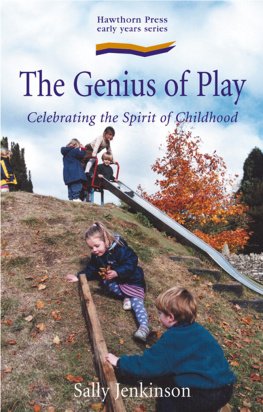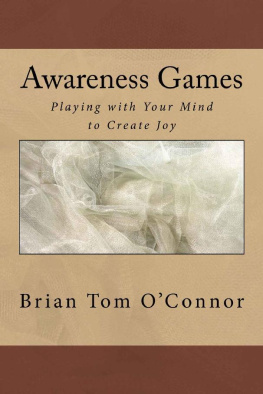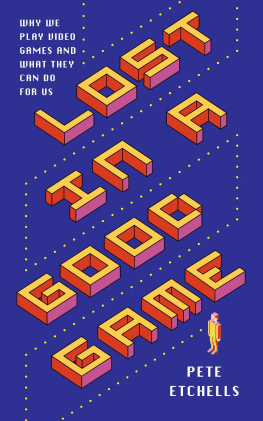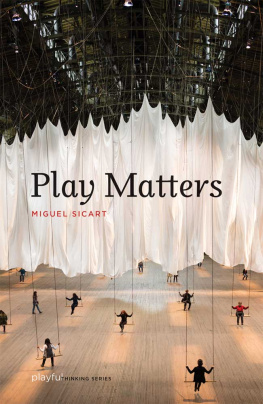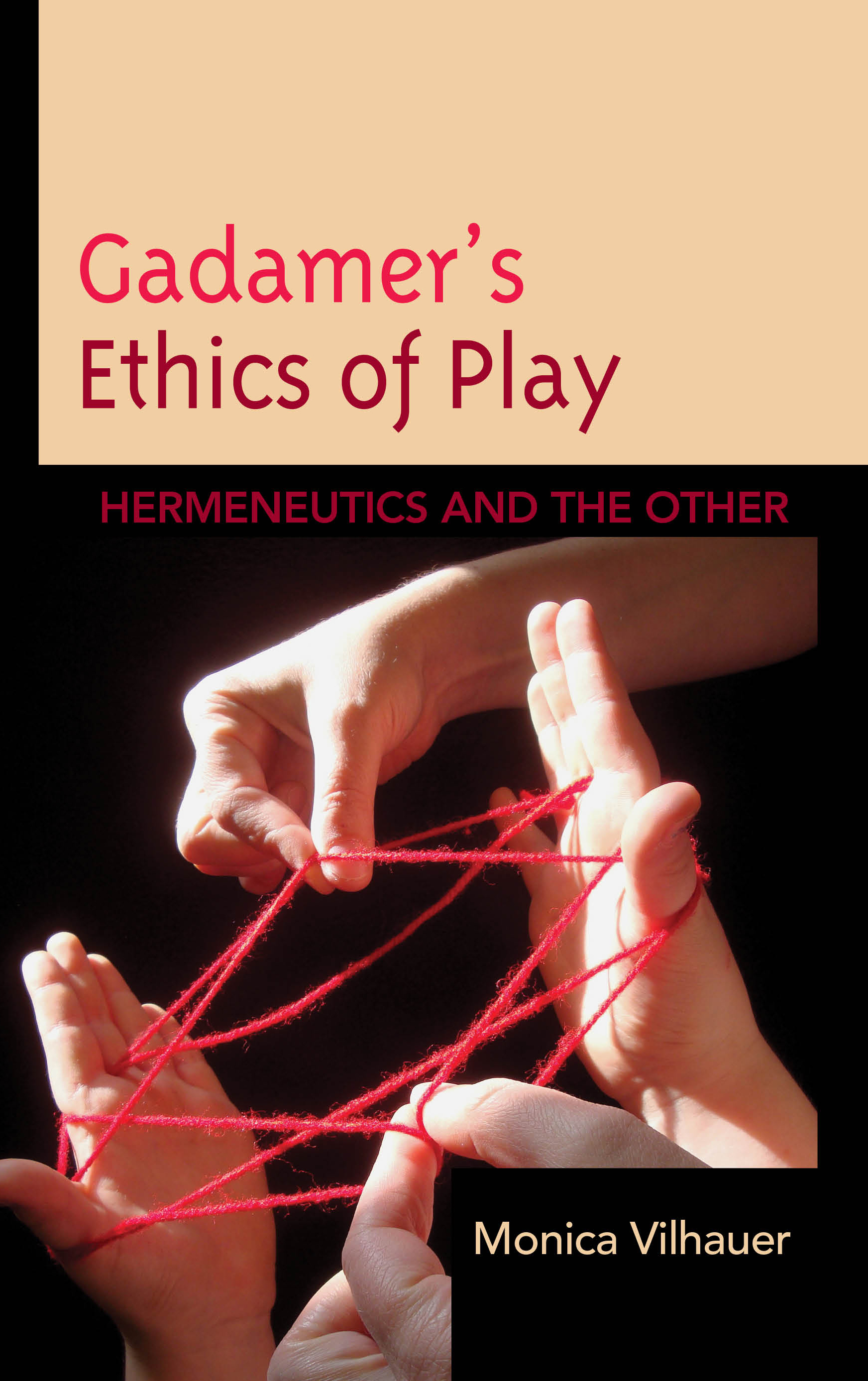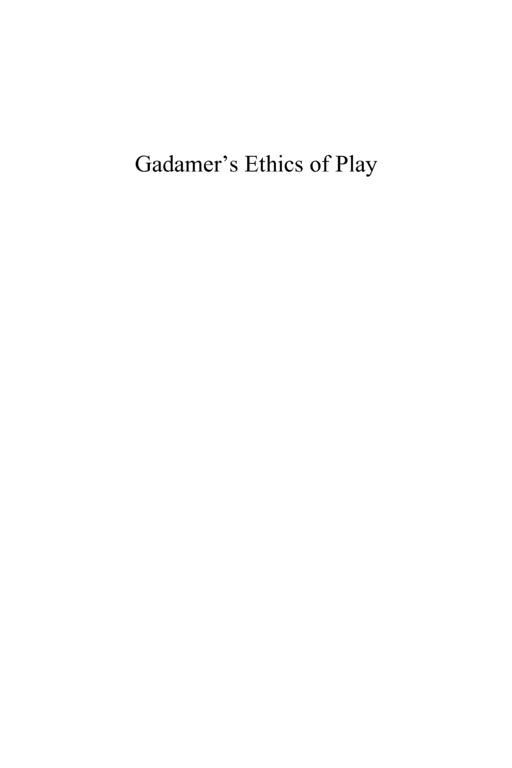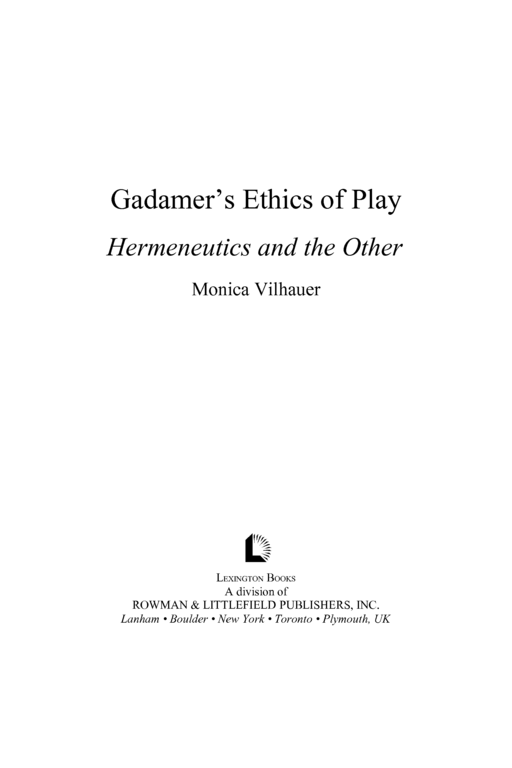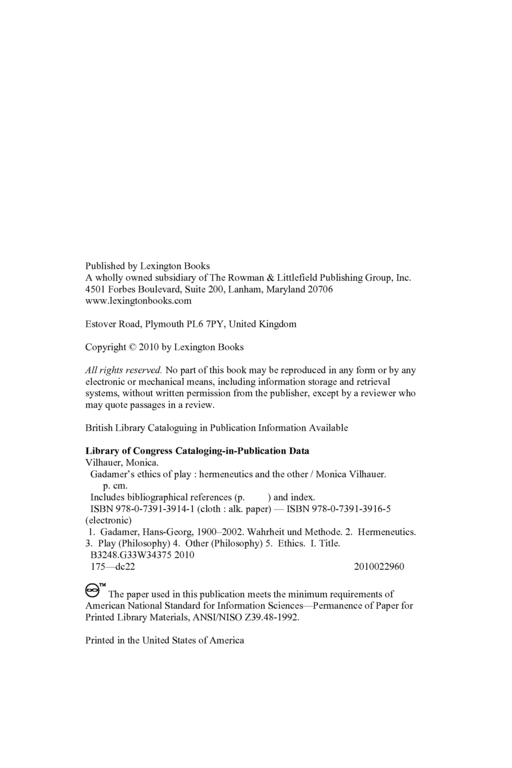Contents
Acknowledgments
Introduction: An Invitation to Play
Part I: Gadamers Hermeneutic Problem
| 1 | Facing the Inadequate Model of Modern Science |
Part II: Gadamers Concept of Play: Re-Conceiving the Process of Understanding
| 2 | Introducing the Key of Play |
| 3 | Understanding Art: The Play of Work and Spectator |
| 4 | The Play of Interlocutors: Understanding as Dialogue |
Part III: The Ethical Dimensions of Play
| 5 | The Ethical Conditions of Dialogic Play: Between I and Thou |
| 6 | Genuine Play in Action: The Model of the Philosopher |
| 7 | The Value of Genuine Play: Transition to Play as a Guide to Life |
| 8 | Play and Practical Philosophy: Play as a Guide to Life |
Part IV: When Ethical Conditions are Lacking
| 9 | The Problem of Closedness |
| 10 | Cultivating an Opening to Dialogue |
Bibliography
Index
About the Author
Acknowledgments
This project has gone through a number of stages on the way to its final form as a book. Id like to offer my thanks to a number of teachers, colleagues, and friends who have supported the life of this work as it has developed.
First, I offer great thanks to those teachers who nurtured and critiqued my early work on Gadamer at the New School for Social Research. My special thanks go to Richard Bernstein, who introduced me to Gadamer and offered me much needed encouragement while I was writing a first version of this book. His enthusiasm in the classroom, and his special ability to recognize, and hold in check, all signs of sophistry, continues to inspire me in my thinking and in my own teaching. I also want to offer special thanks to Alice Crary and Dmitri Nikulin for their thoughtful feedback on my early draft of the present work, and their willingness to offer guidance any time I needed it.
Second, I am grateful to my colleagues in the Religion and Philosophy Department at Roanoke College, who have so kindly offered their friendship and advice to me as I have attempted to learn how to juggle the three balls of teaching, research, and service. My thanks go to Brent Adkins, Jennifer Berenson, Paul Hinlicky, Marwood Larson-Harris, Gerry McDermott, Eric Rothgery, Ned Wisnefske, and Hans Zorn. I am so thankful for their collective wisdom, and the openness with which they have welcomed me into the department. I am also grateful to Roanoke College for the Faculty Scholar Award, which offered me the time necessary to complete my manuscript and prepare it for publication.
Third, there is a special group of friends out there that has been willing to brainstorm with me, strategize with me, and read and respond to my writing as the long process of this project has come to a close. I am indebted to these people for their thoughtfulness, time, and conversation. Thank you to Jake Vilhauer, Brent Adkins, Lauren Swayne Barthold, and Rachel Neithercut for helping me to reach the finish line!
I presented many of the ideas from chapter 3 to the Graduate Faculty Women in Philosophy group at the New School for Social Research in 2004, and am thankful for the thoughtful feedback of that group. I also want to thank the editors of the Women in Philosophy journal of the New School for Social Research for the permission to revise and use my article Understanding the Play Structure of Understanding: The Model of Art, from the 20042005 volume of the WIP journal, in this book. I presented many of the ideas from chapter 6 to the XVIth International Symposium of the Olympic Center for Philosophy and Culture in 2005, and benefited from conversations with participants of the symposium. I thank the editor of Skepsis for the permission to revise and use parts of my article Socratic Dialogue and the Ethical Conditions of Knowledge, from Skepsis volume 26:12, 2005, in this book. I presented ideas from chapters 3, 4, and 5 at the Eastern Division meeting of the American Philosophical Association in 2008, and the Society for Phenomenology and Existential Philosophy meeting in 2008. I am thankful for the insightful questions and comments offered by participants at both meetings, especially those of Lauren Swayne Barthold, who commented on my paper at the Eastern APA meeting. I thank David Pellauer, editor of Philosophy Today , for permission to include portions of my SPEP paper in this book, which appeared in volume 53:4 (Winter 2009) of Philosophy Today under the title Beyond the Fusion of Horizons: Gadamers Notion of Understanding as Play. Finally, I appreciate the permission that Continuum International Publishing Group has offered me to publish portions of Truth and Method in this book.
I want to thank, also, an anonymous reviewer enlisted by Lexington Books, whose careful reading of the manuscript and tough criticism has pushed me to make the book better.
I am grateful to Jeff Hofmann for creating the cover art for this book with the subject matter of its contents in mind. I am particularly thankful for the support and patience Jeff has offered me through the string of all-consuming deadlines associated with this book project, and I am also thankful for the enthusiasm with which he took on the project of the cover art. I am proud that his artistic talent can be displayed across the front of this work.
Last, I want to thank, above all, my family for their love, support, and humor, without which I could not accomplish much at all. They are the enduring dialogue partners of my life. I am forever indebted to them for teaching me more about the practice of engaged conversation, ethics, and openness than I could ever hope to extract from any book.
Introduction: An Invitation to Play
Could you really persuade, he said, if we dont listen?
Platos Republic , 327c
In a wide variety of contexts today, both public and private, we face an outbreak of conflict and division in which there exists a disturbing failure to understand one another in the most vital of matters. Closely partnered with this phenomenon is the widespread rejection of all dialogue in which such an understanding might take place. On the global scene, a dangerous abandonment of dialogical relations and the turn to force abounds between nations, cultures, religions, and tribes. Leaders around the world declare that the time for talk is over and that negotiation is futile. On the national scene, members of differing political parties are unable to have a real conversation with each other about anything. The so-called talking heads on our television sets talk past each other, and sound more like barking dogs than genuine debate partners. On an interpersonal scale, the conversation-stopping phrase you just cant understand me because of a difference in gender, race, class, sexual orientation, or ethnicity (take your pick) commonly halts discussion. On occasion, those uninterested in engaging in even the most preliminary verbal exchange utilize the recognizable talk to the hand gesture, declaring that all words one might want to speak will fall on deaf ears. This division, spanning such a spectrum of social contexts, is all the more troubling as we recognize the necessity of cultivating more and more fully a global community that can deliberate and act upon shared concerns (concerns such as the health of our environment, human rights, a world economy, depleting natural resources, disease, protecting ourselves from nuclear or biochemical destruction, etc.). In the face of this contemporary demand, we find ourselves confronted with the pressing questions: What causes dialogue to break down? And, what do we do once it has? On the eve of the oft-repeated time for change, my hope is that we are ready to seek an answer.




